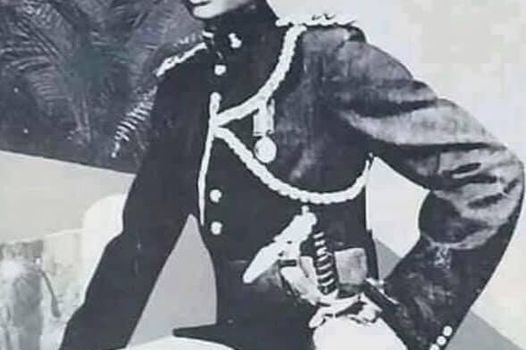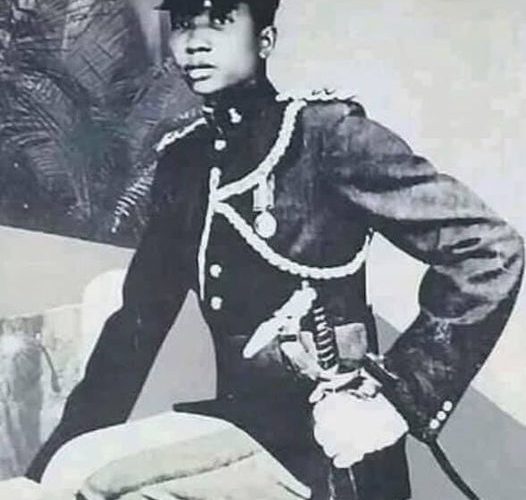

By: Chukwudum Ikeazor Just over a week ago, I received the news that Emmanuel Nworah Nwobosi had died -on Tuesday 24th November. He was...


By: Chukwudum Ikeazor
Just over a week ago, I received the news that Emmanuel Nworah Nwobosi had died -on Tuesday 24th November.
He was an alumnus – St John’s College, Kaduna, Nigerian Military Training College, Zaria, Sandhurst Military Academy, England, and US Army Field Artillery School, Fort Sill, Oklahoma, USA.
He was a Captain in the pre-war Nigerian Army, a Colonel in the Biafran Army and head of Defence Operations HQ. He was also and until his death a Cabinet Chief at Obosi with the title the Ogene of Obosi.
My friend, kinsman and chief stands down from this earthly journey. He goes the way of the ancestors on a journey that comes to all at some point in time.
He died in our hometown Obosi only a couple of weeks after our last phone call and just a day or less before our next hoped-for phone conversation. I had actually called him a few days prior but we could not have any meaningful conversation as the telephone network was playing its Nigerian game of “not working” and not letting us hear each other clearly enough. I could only yell into my receiver that I would call again and hope to get a better connection. Now, I know can never call him again on the phone or ever hear his voice.
He was a friend of my late father and I met him for the first time the 1960s, during one of his visits to my parents’ home at Onitsha. I think he was the first or second army officer I met. He certainly was the first I have a sustained memory of. He was tall and looked resplendent in his uniform.
In his later years, we became very close as we talked about history, politics, wars and coups and so on, and his role in Nigeria’s first military coup and the Biafran war. I was not lapping up everything that was given to me without query, comment or even challenge and we had robust discussions which he welcomed. But for a few details or aspects, our views on the events were in sync and I knew that if I was of age at the time and had the opportunity to take the action they took that I would very likely have, seeing things they way they were at the time. I was waiting for my time to join the Biafran Army, that is my time to be old enough, but the war came to an abrupt end with the collapse of the Biafran resistance.
Captain Nwobosi of the Nigerian Army (as he was then), was one of the small group of officers, who carried out Nigeria’s first military coup in January 1966. Their intervention which sought to bring to an end the political chaos and bloody strife that had engulfed parts of the country was bloody in its execution and unsettling in the ethnic colouration of its casualty toll. It was a coup that was intended to halt the national drift and ongoing bloody political strife and which was hurriedly implemented to pre-empt another military strike, codenamed, “Operation No Mercy”. Their coup and the policies of the succeeding military regime were to provoke another and an even bloodier one later on in the year and that also opened the floodgates for a massive pogrom in which tens of thousands of civilians were killed.
Fast to forward to the following year, there is a breakdown in trust in the country, the basis of unity shattered, a secession follows and this results in a civil war.
The war ended in January 1970 by which time some 2,000,000 lay dead. I was one of those who emerged from what was once proudly and defiantly Biafran, to return to Nigeria to resume life as Nigerians.
Colonel Nwobosi who played a key role in that January 1966 coup and the Biafran rebellion found himself forced into exile. He first flew to Ivory Coast and Portugal. He later relocated and settled in Guyana in South America and from there to Canada and later the United States. He returned from exile sometime in the 1980s following a pardon facilitated by his friend, General Domkat Bali, who died a few days ago, and just a week after Colonel Nwobosi’s death. He had spoken very affectionately of General Bali, whom he served with last at the Abeokuta artillery unit attended a training course at Fort Sill, Oklahoma, in the US. He spoke very sadly of what was now the terminal illness which had overcome his friend. Both men were on opposite sides during the Biafran war, but he pointed out to me that the war did not diminish their friendship in any way. He noted that when they spoke about the war over a drink that they both noted that they had duties to do as soldiers and were just glad that they never had to directly confront each other on the battlefield.
Colonel Nwobosi was the quintessential officer and gentleman. He was a member of the Sovereign’s company at the Sandhurst Military academy and only a few years ago he reunited with his colleagues from his time there. He was looking forward to a reunion and a visit to Sandhurst at the opportunity of another visit to England. He was great company – well-spoken, dignified, personable and humble, and fully armed with his repertoire of mess jokes and battle anecdotes.
He was fully cognizant of the controversial nature and the historic and deadly significance of the January 1966 coup, but felt like most, in history, who have taken drastic and sometimes deadly mission-driven steps that he and his colleagues did what they had to do. With respect to some of the judgments directed at them, and some quite appropriate, he noted that many of those were in hindsight and only arose because their venture ultimately failed or did not result in their intended government and plans. I very much agree with him. Success, (no matter how flawed or abhorrent those successful may be), has many fathers and failure regardless of whatever high ideals assigned or claimed is a most lonely orphan.
He had been working on his memoirs for a few years in collaboration with another individual, but that venture collapsed in circumstances that caused him and his family great concern and anguish. He was forced to start afresh on a new project, at the age of 80, over a year ago, and I believe he was working towards its publication at the time of his death.
He is the last of the inside planners and operatives of the January 1966 coup and with his death, a human chapter of that event is finally closed.
I miss him, his stories, jokes and laughter. I miss our long nights’ long tales, mostly his. His favourite tipple was brandy and mine was whisky. He took care of his business and I took care of mine. He was my guest in London for a few months just over a year ago. He was just a brilliant company. As he thanked me for hosting him, I thanked him more for the honour and the company, for mine was usually a quiet house.
He invited me to a return match to his home at Obosi and I did attempt a visit to Obosi, during my last trip to Nigeria in Feb/ March of last year, but Covid the spoiler of plans struck and I had to beat a hasty retreat to my base.
I came to know him well during his last time in London and I also came to know certain people, certain Nigerians well for their capacity at betrayal and abandonment. The Colonel himself mused that had the fickle hand of fate turned differently in certain ways, that that handful of individuals who had treated him so awfully or dismissively, would have been responding quite differently towards him. He was very right. He was a highly principled man who lived in a very transactional world.
May his gentle soul rest in peace.
Ogene Obosi, no du nma.
Emma Nwobosi Junior and the entire Nwobosi family, I extend my deepest condolences to you on the passing of your beloved father.
May the great Ogene’s soul rest in peace.

